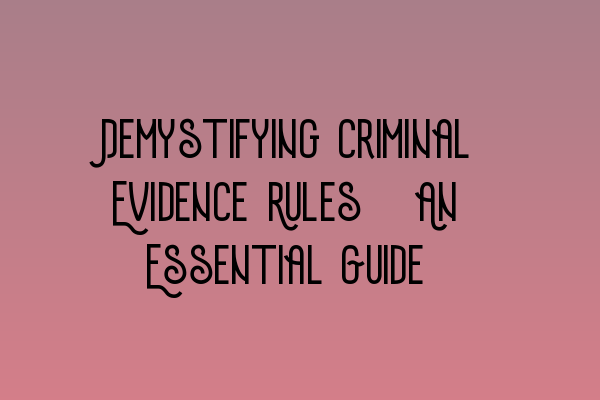Demystifying Criminal Evidence Rules: An Essential Guide
Welcome to SQE Criminal Law & Practice Law UK, your trusted source for all things related to criminal law. In this comprehensive guide, we will demystify the complex world of criminal evidence rules, providing you with the essential knowledge you need to navigate your way through the legal system.
Understanding Criminal Evidence
In any criminal case, evidence plays a crucial role in determining guilt or innocence. It is the foundation upon which legal arguments are built and the cornerstone of a fair trial. Therefore, it is essential to have a clear understanding of the rules surrounding criminal evidence.
When it comes to criminal evidence, a number of rules and principles govern its admissibility, relevance, and weight. These rules ensure that only reliable and valid evidence is presented in court, protecting the rights of the accused and preserving the integrity of the legal process.
The Importance of Knowing the Rules
For any aspiring criminal lawyer or legal professional, a thorough understanding of criminal evidence rules is absolutely crucial. Effective representation and advocacy require an in-depth knowledge of these rules to formulate strong arguments, challenge evidence, and protect the rights of clients.
By knowing the rules, legal professionals can identify potential loopholes, inconsistencies, and flaws in the prosecution’s case, enabling them to mount a robust defense on behalf of their clients. Additionally, knowledge of the rules gives legal professionals the ability to navigate procedural requirements, ensuring that evidence is properly presented and challenged in a court of law.
Key Concepts and Principles
There are several key concepts and principles that underpin criminal evidence rules. These include:
- Relevance: Evidence must be relevant to the issues being tried in court. Understanding what evidence is relevant and how to argue for its admissibility is essential for successful legal representation.
- Admissibility: Not all evidence is admissible in court. Various factors, such as hearsay, prejudice, and improper collection, can lead to evidence being excluded. Knowing the rules on admissibility helps lawyers assess the strength of the prosecution’s case.
- Weight and credibility: Even admissible evidence can vary in its weight and credibility. Understanding how to challenge the reliability and credibility of evidence is crucial for a successful defense strategy.
- Privilege: Certain types of evidence, such as lawyer-client communications, are protected by privilege and cannot normally be admitted. Recognizing and asserting privilege is essential for protecting the confidentiality of legal communications.
Staying Updated and Prepared
Criminal evidence rules are not static, and they can evolve over time through legislative changes and judicial decisions. As a legal professional, it is essential to stay updated with the latest developments in this field. Our SQE 1 Practice Exam Questions and SQE 1 Practice Mocks FLK1 FLK2 articles can help you test your knowledge and keep yourself prepared for the challenges ahead.
Furthermore, to excel in criminal law and practice, consider enrolling in our SQE 2 Preparation Courses and SQE 1 Preparation Courses. These courses are designed to equip you with the fundamental skills and knowledge necessary to succeed in your legal career.
Conclusion
Criminal evidence rules form the backbone of the legal system. Understanding these rules is not only essential for legal professionals but also empowers individuals to have a strong understanding of their rights and protections when faced with criminal charges. By demystifying these rules and making them more accessible, we hope to contribute to a fair and just legal environment for all.
For more information on criminal evidence rules and other legal topics, stay tuned to our website and keep an eye out for our upcoming articles. And if you have any legal queries or require expert legal advice, feel free to contact SQE Criminal Law & Practice Law UK, where our team of experienced solicitors is always ready to assist you.
